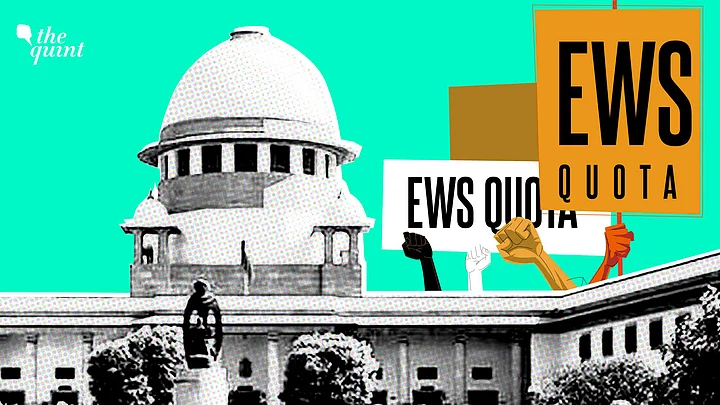The Supreme Court on Monday, 7 November, upheld the validity of the 103rd Constitutional Amendment Act 2019, which introduced 10 percent reservations for Economically Weaker Sections (EWS) in government jobs and educational institutions.
A five-judge Constitutional bench including Chief Justice UU Lalit and Justices Dinesh Maheshwari, S Ravindra Bhat, Bela M Trivedi and JB Pardiwala, had heard the matter and reserved their verdict on 27 September.
Four judgements were pronounced on Monday – while three concurred that EWS quota should be upheld, the two other judges (together) dissented.
However, despite dissenting views in the case of a constitution bench, the majority view is bound to prevail.
“In view of the decision rendered by the majority, the challenge raised to the 103rd amendment fails. The writ petitions and other proceedings stand disposed off accordingly," CJI UU Lalit said.
Justices Dinesh Maheshwari, Bela M Trivedi and JB Pardiwala upheld the validity of EWS reservations and CJI UU Lalit and Justice S Ravindra Bhat, held that the EWS quota was "unconstitutional."
By excluding the poor among SC/ST/OBC from economically backward classes, the amendment practices constitutionally prohibited forms of discrimination.Justice Ravindra Bhat
What Were The Primary Questions Before the Court?
Justice Dinesh Maheshwari, underlined that the bench had delved into three primary questions while deciding on the matter:
1) Whether reservation is an instrument of representation of backward classes and whether economic criteria violate basic structure of the constitution
2) Whether exclusion of the poor belonging to SC/ST/OBC categories from EWS violates the equality code
3) Whether EWS reservation of 10% in addition to 50% reservation violates the basic structure of the constitution.
'EWS Quote Not Violative of Constitution': Majority View
Broadly, Justices Bela M Trivedi and JB Pardiwala, concurred with Justice Dinesh Maheshwari's view that reservation singularly on economic criteria, exclusion of categories in Article 15 (4) and the breach of the 50 percent ceiling limit does not violate the basic structure of the Constitution.
'50% Ceiling Limit is Not Inflexible': Justice Maheshwari
"Reservation is an instrument of affirmative action by State so as to ensure all inclusive approach. It is an instrument not only for inclusion of socially and educationally backward classes...Reservations for EWS does not violate basic structure on account of 50% ceiling limit because ceiling limit is not inflexible," the majority judgment by Justice Maheshwari said.
'Exclusion of SECBs Cannot Be Said as Discriminatory': Justice Trivedi
"It [EWS category] cannot be said to be unreasonable classification...Treating EWS as separate class would be a reasonable classification," Justice Trivedi said while concurring with Justice Maheshwari.
Just as equals cannot be treated unequally, unequals cannot be treated equally. Treating unequals equally violates equality under the Constitution...The amendment creates a separate class of EWS. The exclusion of SEBCs cannot be said as discriminatory or violative of Constitution," she added.
'Amendment Undermines the Fabric of Social Justice': Dissenting View
Important to note is that in their dissenting judgment Chief Justice of India UU Lalit and Justice S Ravindra Bhat did not say that reservation on the basis of economic criteria is violative.
However, according to them by excluding the poor among SC/ST/OBC from economically backward classes (on the ground that they have enjoyed benefits), the 103rd Amendment practices constitutionally prohibited forms of discrimination.
They said:
"Our constitution does not permit exclusion and this amendment undermines the fabric of social justice and thereby the basic structure. This amendment is deluding us to believe that those getting social and backward class benefit is somehow better placed.
The characterization of excluding the poor of SEBCs is incorrect. What is described as benefits cannot be understood as free pass, it is a compensatory mechanism to reparate...The exclusion is based on social origin which destroys the equality code."
They were also against breaching the 50% ceiling in matters of reservation. They said: "Permitting breach of 50% would result in compartmentalisation."
What is the 103rd Amendment, Allowing EWS Reservations, All About?
Simply put, the constitutional amendment (of 2019) lets the centre provide reservations for Economically Weaker Sections of citizens, solely on the basis of economic backwardness.
And it does so by adding an additional clause both to Articles 15 (prohibition of discrimination on grounds of religion, race, caste, sex or place of birth) and 16 (equality of opportunity in matters of public employment) of the Indian Constitution. What this essentially entails is:
1) The central government can make special provisions for the progress of economically weaker citizens, including reservations in educational institutions
2) Such reservation can be made in any educational institution, including private institutions (aided or unaided).
3) Minority educational institutions covered under Article 30(1), however, are exempt from such reservations
4) The upper limit of such reservations will be ten percent, which will be in addition to existing reservations
A Brief Timeline
On 10 January 2019: Parliament passes the Constitution 103rd Amendment Act 2019
In January 2019: A slew of petitions challenging the constitutional validity of the amendment are filed
On 5 August 2020: A three-judge bench comprising the then Chief Justice of India SA Bobde, Justice R Subhash Reddy and Justice BR Gavai refer the case to a Constitution Bench
On 13 September 2022: A five-Judge constitution bench (CB) led by CJI UU Lalit and including Justices Dinesh Maheshwari, Ravindra Bhat, Bela M. Trivedi, and J.B. Pardiwala start hearing the case
After a 7-day hearing, bench reserves verdict on 27 September
Bench passes verdict upholding EWS reservation on 7 November
